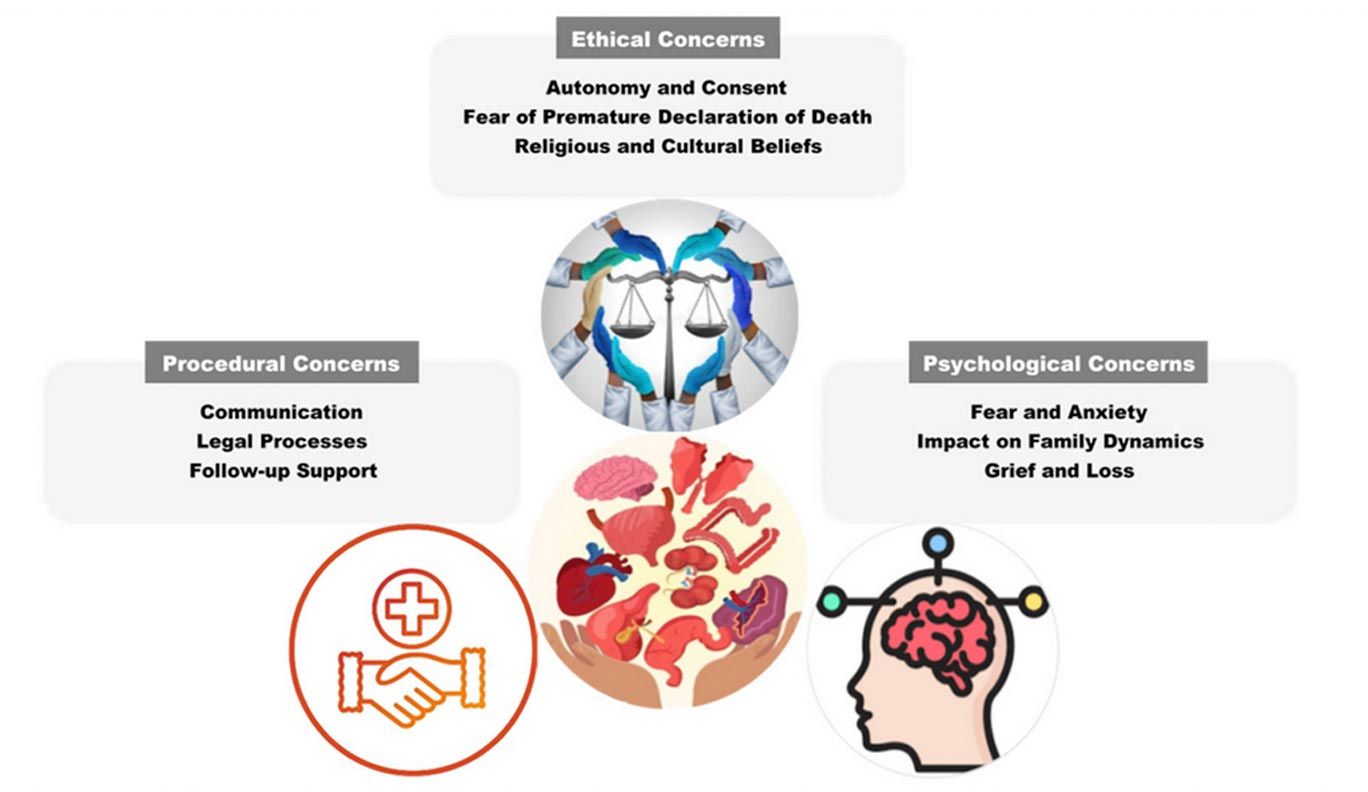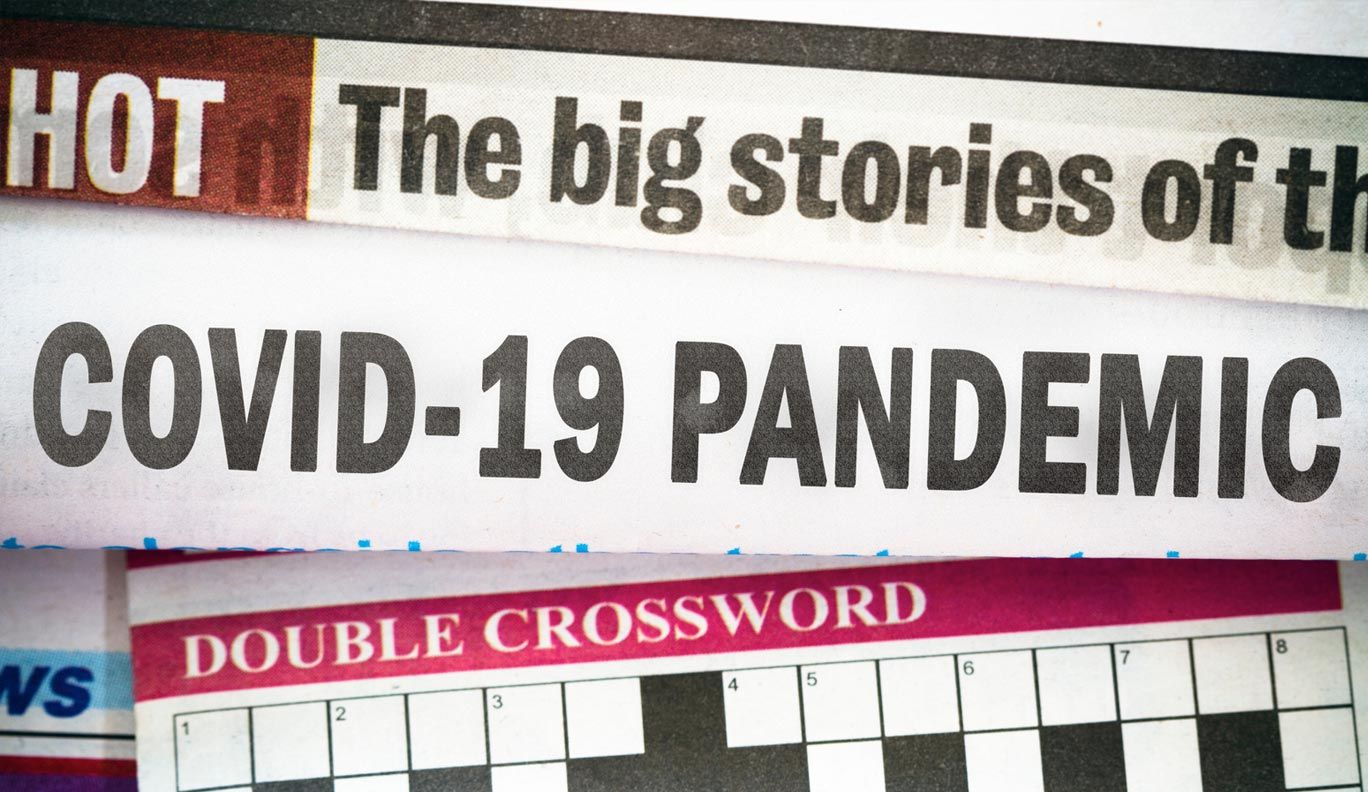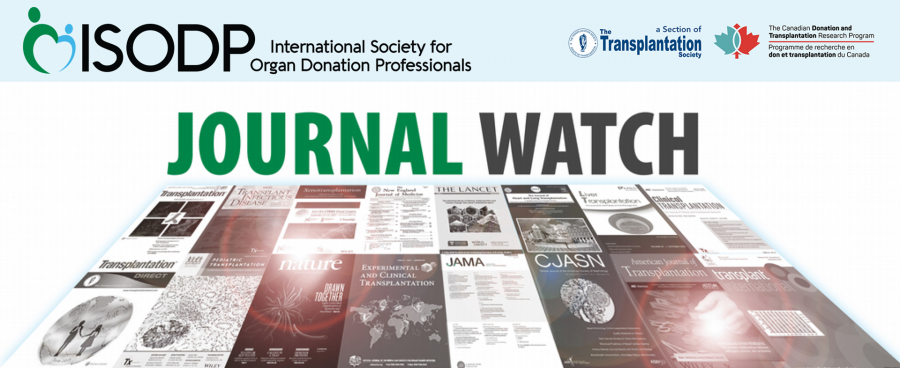Introduction
We are almost into the second half of the year and building well towards the ISODP conference in Kyoto Japan from 3-6 December. For this edition of ISODP’s Journal Watch we have 7 articles. Some looking from the public side and others from the healthcare professional side of the donation request.
There are two articles looking at donation barriers from Kazakhstan and Saudi Arabia which both highlight the need for work in the education and public trust space with unique aspects identified for focus within each country. That local conversations are empowered by local research and advocacy is a key takeaway - there is no one size fits all intervention to fix low donation rates.
On a system level we have a narrative review looking at strategies for increased donor participation and system efficiency which gives a broad overview to readers of what we know to be a multi-faceted challenge.
We also have a mixed methods review offering an in-depth look at the recent roll-out of “deemed consent” legislation in the United Kingdom. The lack of the envisioned success is critically reflected on, with particular focus on the impact of the COVID-19 pandemic on the roll-out of the Act and specifically the healthcare workers tasked with implementation under a time of extreme pressure. The take home message: donation improvement is an ongoing challenge and ensuring the optimum impact of the “deemed consent” legislation will require ongoing work and investment.
A global systematic review synthesizes the experiences of clinical staff approaching families for consent and highlights a major challenge with regard to training.
This training is then expertly reviewed and analyzed in a scoping review which breaks down training on offer in terms of education types, delivery and evaluation methods.
We then explore what such training is primarily for in the final article: keeping the conversation going to allow for informed decision making. For this we have a United Kingdom study looking at four primary barriers which were identified for such conversations taking place: Hastening death, generational differences, ethnic and cultural mistrust and traditional norms and a lack of external prompts.
All in all we hope an interesting read for members of ISODP and we encourage you to disappear down the research avenues these bodies of work are built from and contribute to.
Dr. Thozama Siyotula
(Pediatric Surgeon)
thozama.siyotula@uct.ac.za
Dr. David Thomson
(Critical Care and Transplant Surgeon)
thomson.david@gmail.com

Transforming Organ Donation and Transplantation: Strategies For Increasing Donor Participation and System Efficiency
Olawade, David et al.
European Journal of Internal Medicine, March 2025
Corresponding author: David Olawade - d.olawade@uel.ac.uk
This narrative review examines opportunities and systemic challenges in organ donation and transplantation, emphasizing strategies to increase donor participation and improve system efficiency.
The authors identify several critical barriers:
- Public misconceptions and cultural/religious concerns—often fueled by misinformation—deter potential donors. The review recommends community outreach and engagement with religious and cultural leaders to promote transparent dialogue and build trust.
- Systemic inefficiencies and logistical challenges, including inconsistent allocation practices, lack of standardized protocols, and inadequate infrastructure. The authors propose solutions such as advanced matching algorithms, equitable allocation policies, and increased investment in healthcare resources.
- Donor concerns, including psychological apprehensions, procedural fears, and mistrust in the healthcare system. Addressing these issues requires clear communication, transparent donation procedures, and sustained support for living donors and donor families.
To improve donor registration and participation, the authors advocate for:
- Public education campaigns to correct myths and raise awareness.
- Implementation of opt-out systems, as seen in the UK, to shift the default assumption toward donation.
This last point is interesting as the evidence base for opt-out improving donation rates is not overwhelming although it may be a reflection of overall public support to have such legislation in place. Ultimately the review underscores that a multi-pronged, evidence-based approach—incorporating policy reform, education, technological innovation, and cultural sensitivity—is essential to increasing organ availability and saving more lives through transplantation.
Summary prepared by: Dr. Alexandra Maria Buda

Barriers and Willingness to Express Consent to Organ Donation Among the Kazakhstani Population
Bolatov, Aidos et al.
BMC Public Health, March 3, 2025
Corresponding author: Aidos Bolatov - bolatovaidos@gmail.com
In this intriguing cross-sectional study barriers and factors influencing willingness to consent to organ donation in Kazakhstan were analyzed in a country where transplant needs are rising but donation rates remain low.
The study surveyed 1,294 adults to assess socio-demographic variables, knowledge, and perceived barriers related to organ donation. The participants were predominantly female, urban, and well-educated, with a high proportion from medical backgrounds.
The author finds the claim that death is caused by NRP to be uncompelling. DCDNRP does not cause deviation from what would be the normal course of events in that particular context. Steps taken in DCD-NRP protocols are in place to ensure there is no inappropriate resuscitation of the brain and possible restoration of some level of neurological function during the organ recovery process. These steps are not altering the cause or determination of death. The author highlights the challenges of using the counterfactual concept of causation used by the ACP in their statement of concern.
Despite this predominance only 42.5% of participants said they would consent to organ donation, which is lower than in many other areas. Age, ethnicity, family status, and knowledge were significant predictors. Younger participants, single individuals, and those without children were more likely to consent. Russian ethnicity was associated with lower willingness compared to Kazakhs. Urban residents, students, and those with higher education levels were more likely to consent, but these associations became less significant when other variables were considered.
Higher knowledge about organ donation strongly increased willingness. Surprisingly, non-medical participants were more willing than medical professionals, a difference explained by greater religious/cultural concerns and discomfort with posthumous body use among those in the medical field.
Key barriers included distrust in the medical system, fears of organ trafficking, insufficient awareness, and concerns about medical complications. Non-medical participants reported higher levels of distrust and concern about unethical practices, while medical participants were more influenced by cultural and religious considerations. Religious affiliation and religiosity had complex effects. Atheists and agnostics were more willing to donate, while Muslims and Orthodox Christians were less so. However, the extent of religiousness alone was not a strong predictor.
Insufficient awareness and education were major obstacles. Those recognizing these gaps were paradoxically more willing to donate, possibly reflecting a desire for informed decision-making. The study highlights the need for educational campaigns to address misconceptions and improve public trust in the medical system. Interventions should be culturally sensitive and involve faith leaders to address religious concerns. Transparency in organ allocation and public communication are essential to dispel fears about unethical practices. The findings, though limited by sample representativeness and reliance on self-reported data, provide a foundation for strategies to increase organ donation rates in Kazakhstan.
Summary prepared by: Dr. Anya Joubert

Perceptions and Experiences of Healthcare Professionals of Implementing the Organ Donation (Deemed Consent) Act in England During the COVID-19 Pandemic
Al-Haboubi, Mustafa et al.
BMC Health Serivces Research, January 31, 2025
Corresponding author: Mustafa Al-Haboubi - mustafa.al-haboubi@lshtm.ac.uk
This study explores healthcare professionals’ (HCPs) perceptions and experiences in implementing the Organ Donation (Deemed Consent) Act—commonly referred to as the ‘opt-out’ legislation—in England during the unique challenges posed by the COVID-19 pandemic. Using a mixed-methods approach that combined surveys, interviews, and observations, the study examined how HCPs navigated the new legal framework, particularly in the face of the ethical, logistical, and emotional complexities intensified by the pandemic.
The findings reveal that COVID-19 had a significant impact on every aspect of the Act’s implementation. The study assessed HCPs’ initial understanding and attitudes toward the deemed consent model, their expectations of its effect on donation rates, and the dynamics of conversations with families. Frontline experiences uncovered both facilitators and substantial barriers to operationalizing the Act during a time of extreme systemic stress.
Key obstacles included resource reallocation, staff redeployments and resignations, burnout, reduced capacity for non-urgent procedures, and heightened public anxiety. While most HCPs supported the principle of deemed consent, many expressed scepticism that legal changes alone would significantly increase donation consent rates.
Several major themes emerged, including:
- The perceived effectiveness of the policy in boosting donations
- The challenges of family engagement and consent discussions
- The emotional toll on staff during such interactions
- The demoralizing impact of unchanged consent rates in donor audit data
The authors note that staff shortages and systemic strain severely hindered interprofessional collaboration, a critical element for the Act’s successful implementation. Many participants suggested that the policy rollout would have been more effective if delayed until after the pandemic. The study concludes that to realize the full potential of the deemed consent legislation, the NHS should prioritize renewed implementation efforts in the post-pandemic context. This includes targeted staff training, better communication strategies, and robust support systems to manage the psychological impact on HCPs.
Overall, the research offers essential insights into the realities of implementing major healthcare legislation during a public health crisis and provides guidance for shaping future policy and practice in organ donation systems.
Summary prepared by: Dr. Eghosa Obaseki

Awareness and Willingness Toward Organ Donation Among Riyadh Residents: A Cross-Sectional Study
Alghalyini, Baraa et al.
Healthcare (Basel), July 16, 2024
Corresponding author: Abdul Rehman Zia Zaidi - arzaidi@alfaisal.edu
This cross-sectional study assessed awareness and willingness toward organ donation among adult residents of Riyadh, Saudi Arabia. Conducted between April and December 2023, the study recruited 645 participants through convenience sampling in public areas and via social media. Participants completed a structured questionnaire capturing demographic data, knowledge of organ donation, willingness to donate, and registration status.
Findings revealed that while 56.4% of respondents expressed willingness to donate their organs, only 9.5% had registered as donors. Gender emerged as a significant factor: women—motivated by higher levels of empathy and altruism—were nearly three times more likely to express willingness than men, although most of those registered were male. Educational attainment was also associated with higher registration rates.
The most common motivations for willingness to donate were the desire to help others (85.2%) and religious beliefs (14.2%). However, religious concerns were also a major reason for reluctance to donate (80.5%). Awareness of the Saudi Centre for Organ Transplantation (SCOT) positively correlated with willingness to donate.
Families often prefer donating solid organs over tissues, possibly due to a lack of awareness, misconceptions, and emotional factors. The study highlights the need for better public education on tissue donation and improved family counseling. Legislative changes and public awareness campaigns may have contributed to the declining refusal rates.
The most common motivations for willingness to donate were the desire to help others (85.2%) and religious beliefs (14.2%). However, religious concerns were also a major reason for reluctance to donate (80.5%). Awareness of the Saudi Centre for Organ Transplantation (SCOT) positively correlated with willingness to donate.
The pronounced gap between willingness and actual registration points to significant barriers, including misinformation, religious reservations, and limited access to straightforward registration pathways. To address this, the authors advocate for comprehensive public education campaigns that clarify misconceptions, target cultural and religious concerns, and increase visibility of SCOT’s role. Additionally, they suggest that adopting an opt-out donation system in Saudi Arabia—similar to models used in other countries—could substantially boost registration rates.
Overall, the study offers valuable insights into modifiable factors influencing organ donation behaviour in Riyadh and provides actionable recommendations to enhance donor registration in culturally similar settings.
Summary prepared by Dr. Manahil Malik

The Experiences of Clinical Staff Approaching Families for Organ Donation Consent: A Systematic Review and Thematic Synthesis of Qualitative Studies
Pengel, L.H.M et al.
Transplantation Reviews, May 5, 2025
Corresponding author: Liset Penge - l.pengel@erasmusmc.nl
Looking at donation requests from the side of the healthcare practitioners (HCPs) making requests, this systematic review and thematic synthesis examines the experiences of HCPs who approach families for organ donation consent. Drawing from 92 qualitative studies conducted across various international contexts, the review explores the emotional, ethical, and professional challenges these clinicians face in initiating donation conversations.
A central theme identified is the “paradox” HCPs navigate—balancing the life-saving goals of organ transplantation with the emotional weight of discussing death with grieving families. This tension is shaped by their own beliefs, professional responsibilities, and the broader societal imperative to address organ shortages. The process is further complicated by philosophical dilemmas within medicine, where death is often perceived as a failure. Key factors influencing the experience include: cultural and religious considerations, timing of the conversation, the importance of interdisciplinary collaboration.
While the review also examined interventions intended to improve organ donation outcomes, the quantitative evidence was too heterogeneous to draw firm conclusions about their effectiveness on consent rates. However, some studies did report improvements in HCPs’ self-efficacy and comfort levels, particularly following communication training. Other reviews cited by the authors suggest that multidisciplinary strategies, decision aids, and structured training programs can positively influence both staff confidence and family engagement.
The review emphasizes the multiple “care shifts” experienced by HCPs: from saving the patient’s life, to supporting the family during bereavement, to managing organ retrieval and ultimately contributing to saving lives through transplantation. To successfully manage these transitions, three core attributes are considered essential:
- Comprehensive knowledge of the organ donation process and criteria
- Strong communication skills for engaging in emotionally charged conversations
- Emotional regulation skills to manage personal reactions while providing compassionate care
The authors advocate for targeted training that explicitly addresses death and dying, along with organizational support that fosters a “culture of organ donation.” Establishing such a culture—where all clinical staff are prepared, supported, and aligned—can benefit both professionals and families and improve donation practices globally.
Summary prepared by: Dr. Hettie Le Roux

Exploring Educational and Training Approaches for Organ and Tissue Donation Coordinators: A Scoping Review
Silva E Silva, Vanessa et. al
Nurse Education Today, February 11, 2025
Corresponding author: Vanessa Silva E. Silva - vsilvaesilva@brocku.ca
This article reviews education strategies for the training of organ and tissue donation coordinators. As such training is limited and impacts service quality and work-related stress it is key that we understand existing educational strategies and training methods being used to better support professional development.
Done as a scoping review 33 articles were ultimately included and analyzed across three domains:
- Education types and engagement
These included Master’s degrees (n = 1), diploma / certificate programs (n= 5) and mainly continuing education programs (n= 26). - Education strategy development and delivery
These studies showed varied focus points of training and also varied delivery methods which included in-person communication (the majority, n = 18), virtual (the minority, n = 6) and hybrid strategies (n=9).
Interestingly costs were only included in 7 of the articles reviewed and the level of detail was low in this regard. - Education evaluation methods and outcomes
Assessments of education interventions varied. Surveys were most commonly used (n=15). Pre and post testing was also used (n = 8) and formal examinations in very few (n=4). Encouraging the impact on donation and consent rates and organ recovery rates was studied in 10 studies with only 2 showing no impact in this regard.
All in all a very well constructed article with a thorough review of peer reviewed and published literature looking at education strategies in this space. Recommended reading for educationalists and also a call to study our educational interventions more.
Summary prepared by Dr. David Thomson

Barriers to Conversations About Deceased Organ Donation Among Adults Living in the UK: A Systematic Review With Narrative Synthesis
Weeks, Simonne et al.
BMJ Open, March 12, 2025
Corresponding author: Connor Thompson - C.Thompson3@Brighton.ac.uk
An excellent article for deceased donation requestors. This systematic review examines the social and cultural barriers that hinder conversations about deceased organ donation among adults in the UK. Based on a synthesis of 11 studies—both qualitative and quantitative—it identifies key themes contributing to reluctance or avoidance of family discussions around organ donation.
Four primary barriers emerged:
- Superstition and the “jinx” belief—the idea that discussing death might hasten it—was common across several cultural groups, discouraging open dialogue.
- Generational differences often led younger adults, who were generally more supportive of organ donation, to avoid initiating conversations with older family members.
- Ethnic and cultural disparities, influenced by religious beliefs, mistrust in the healthcare system, and traditional norms, created additional communication challenges.
- Lack of external prompts, such as public health messaging or cues from healthcare professionals, meant that organ donation rarely arose naturally in family conversations.
Despite these barriers, the review also identified potential facilitators. Culturally tailored messaging, personal storytelling, and community-based outreach were found to encourage more open discussion and may help normalize donation conversations.
The authors call for further research to assess the effectiveness of targeted interventions across diverse communities. They emphasize the importance of culturally competent communication strategies in national organ donation campaigns to promote equitable and informed participation.
Summary prepared by Anja Meyer (RN)
Social
Contact
Address
International Society for Organ
Donation Professionals
c/o The Transplantation Society
740 Notre-Dame Ouest
Suite 1245
Montréal, QC, H3C 3X6
Canada



